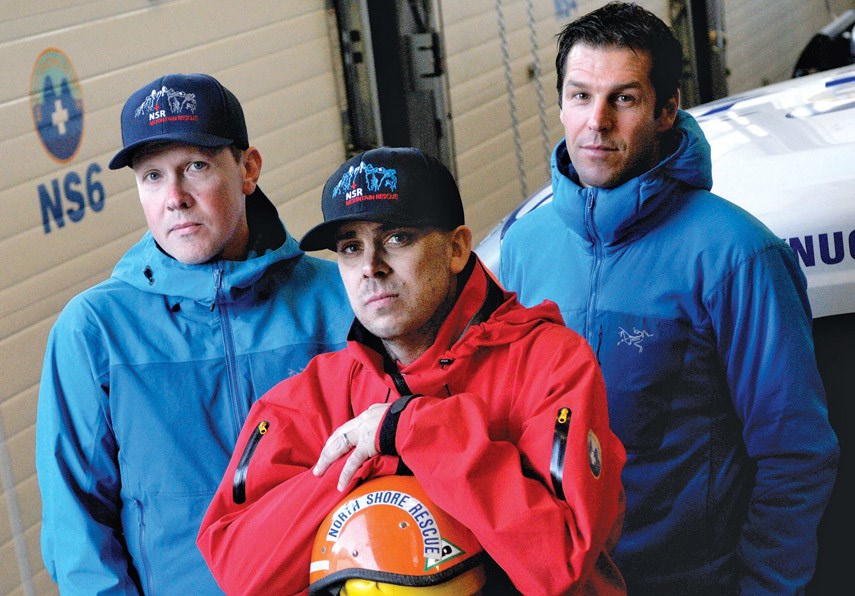For North Shore Rescue’s volunteers, when the chopper has landed and when the gear is washed and put away, the mission is rarely done.
Months or years later, they’re likely still carrying a heavy burden that isn’t a person in a stretcher but rather the emotional trauma that comes with job they volunteer for.
Team leader Mike Danks has been recovering bodies and helping the gravely wounded in the backcountry for most of his life but there are few missions that have left permanent marks.
Just before Christmas in 2014, he was part of the team dispatched to save Erin Kate Moore, a Lions Bay girl caught in a rock slide.
“We knew what we were coming into. It was a seven-year-old we were told was in cardiac arrest, crushed by a boulder,” he said. “We did everything we could to try to save her life.”
A physician teammate pronounced her dead at the scene. Danks was tasked with taking photos for the coroner’s investigation. When he returned home, he couldn’t help but make the connection with his own family and he couldn’t stop replaying the events in his head.
“I just couldn’t get over the fact this girl was doing such a wonderful thing, hiking with her family, and this tragedy happened out of nowhere. My daughter was exactly the same age at the time,” he said. “I kind of broke down inside. I never experienced anything like that but I also didn’t want to share that with anybody. I was almost a little bit ashamed that I was weak.”
Other members reported having a similar problem after last week’s fatal fall on Crown Mountain.
“We had so many questions about why this death occurred, and why did it happen? And did we do the right thing?” Danks said. “That’s when it struck me quite hard. We need to do more for our members.”
This week, North Shore Rescue became the first search and rescue outfit in B.C. to undergo resiliency training. It was developed by the B.C. Professional Firefighters’ Association but adapted for SAR purposes.
“(Trauma) is going to happen regardless but we can try to minimize the impact,” said Scot Dickson, a firefighter who presented the course to North Shore Rescue. “By being able to recognize it, we can hopefully be able to take the steps to get treatment in whichever form that is, whether it’s self-treatment or professional treatment to overcome whatever trauma that we’re experiencing.”
Bracing one’s self for a difficult scene is often one of the blind spots in the thick of an intense rescue call, Dickson said.
“We eat well. We wear the right clothing. We’re physically fit. We do everything else to take care of ourselves and prepare. We train. We know the systems. But almost never do we try to prepare mentally for what we’re about to see,” he said.
About 40 of the team’s members and their spouses took the training this week. Having spouses there was key as they’ll probably be the first to notice when trauma has set in: Out of characteristic behaviour, becoming emotionally withdrawn or agitated.
“It’s very hard for people to come out and admit this sort of stuff and that’s what we’re trying to break down here,” Dickson said. “You’re having a normal reaction to an abnormal event.”
Volunteer Doug Reid has been through enough of those events himself to know.
“For me it could have been a compounding effect of call after call after call followed by one trigger point,” Reid said.
That trigger was this spring’s Mount Harvey avalanche, which killed five hikers. After helping in the recovery, Reid noticed his daily routine was changing. He became lethargic and moody, and found getting through the day at work to be a struggle.
“You keep on reliving the experience in your head, over and over again. When you’re sitting at home and you’re trying to watch TV and you’re just going through the whole situation again. It doesn’t allow any closure to the situation,” he said.
People tend to replay the traumatic incident over and over because they’re left with unanswered questions, Dickson said.
One of the techniques that North Shore Rescue will now make standard is a mandatory debrief with all the members involved to focus on just that.
“Going forward, after every major call, we’re going to deal with it and we’re going to make sure all questions are answered and we’re not going to get to the point where we have a compounding effect and one tiny call puts someone over the edge,” Reid said.
Danks said he’d like to see the training expanded to include all of B.C.’s 80-plus search and rescue teams.



